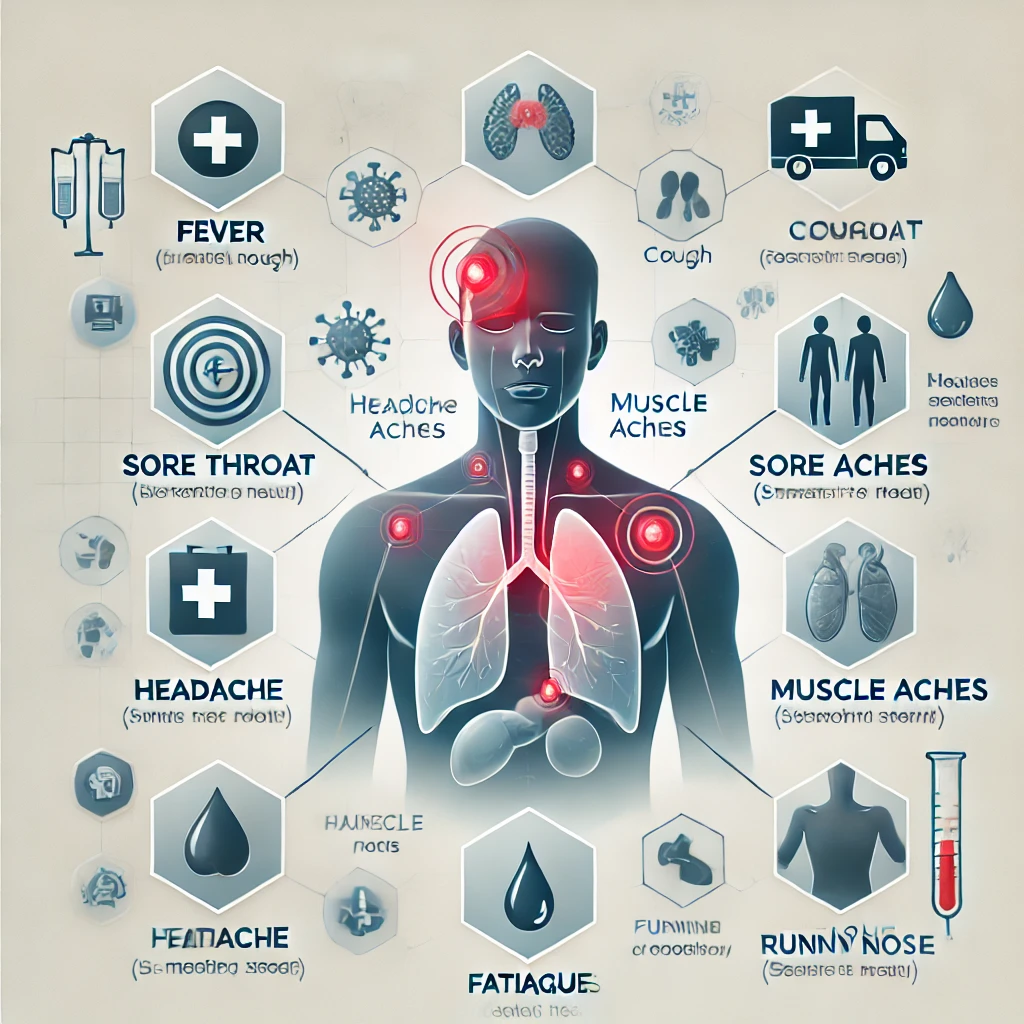Flu Symptoms: Causes, Symptoms, and Prevention Tips


What is the Flu?
Flu Symptoms, The flu (influenza) is a respiratory illness caused by the influenza virus. While it shares similarities with the common cold, flu symptoms are more severe and progress more quickly. The flu is highly contagious, especially during winter, and can be particularly dangerous for high-risk groups such as the elderly, children, and pregnant women.
Symptoms of the Flu
Flu symptoms usually come on suddenly and may include:
- Fever: Typically a high fever above 38℃ (100.4℉).
- Cough: Often a dry cough.
- Chills and Sweating: Feeling cold and experiencing sweating episodes.
- Sore Throat: Pain or irritation in the throat.
- Runny or Stuffy Nose: Similar to cold symptoms.
- Headache: Persistent pain or pressure.
- Muscle and Joint Pain: Body aches similar to soreness.
- Fatigue: Feeling unusually tired and drained.
- Digestive Symptoms: Nausea, vomiting, or diarrhea (more common in children).
Symptoms can vary from person to person, and those with weaker immune systems may experience more severe symptoms.
Differences Between the Flu and a Common Cold
| Category | Common Cold | Flu |
|---|---|---|
| Fever | Rare or low-grade | High fever (38℃ or above) |
| Onset Speed | Gradual | Sudden |
| Muscle Pain | Rare | Severe |
| Fatigue | Mild | Extreme |
The flu is more serious than a common cold and carries a higher risk of complications, making timely care essential.
Causes and Transmission of the Flu
The flu is caused by influenza viruses, primarily types A and B, and spreads through:
- Respiratory Droplets: Virus-laden droplets released by coughing or sneezing.
- Contact Transmission: Touching contaminated surfaces or hands and then touching your face.
Flu Prevention Tips
To prevent the flu, follow these steps:
- Get a Flu Vaccine: Annual vaccination helps protect against virus strains.
- Practice Good Hygiene: Wash hands frequently and avoid touching your face after being outside.
- Wear a Mask: Especially in crowded spaces or during flu season.
- Boost Immunity: Maintain a healthy diet, exercise regularly, and get enough sleep.
Flu Treatment Options
If you catch the flu, you can manage symptoms with these measures:
- Rest and Stay Hydrated.
- Use Over-the-Counter Medications: Such as acetaminophen or ibuprofen for fever and pain.
- Consult a Doctor: Seek medical attention if you are in a high-risk group or suspect complications.
Flu Symptoms, Conclusion
The flu is a fast-developing illness that can lead to serious complications, but it can be managed and prevented with the right steps. High-risk individuals should get vaccinated annually and seek immediate treatment if symptoms arise. Adopt healthy habits to prepare for flu season and protect your well-being.
Recent Posts
How Does Blood Pressure Variation Affect Kidney Health?
High blood pressure silently damages the body—especially the kidneys. This post explains how blood pressure…
What is Glomerular Filtration Rate (GFR)? Understanding Kidney Health Made Easy
What is Glomerular Filtration Rate? Have you ever heard your doctor say, "Your GFR looks…
Healthy Soup Choices for Diabetes and Kidney Disease Patients
Should Diabetes and Kidney Disease Patients Avoid Soup Dishes? One of the most common pieces…
Predicting the prognosis of Chronic Kidney Disease with KFRE:
Why Is KFRE Gaining Attention? Chronic Kidney Disease (CKD) is often a “silent” condition. Many…
Latte vs Americano: Which Is Healthier for People with Diabetes or Kidney Disease?
Coffee is part of daily life — but how does your choice affect your health?…
Is Vitamin B12 High in Any Fruit? A Complete Guide for People with Diabetes and Kidney Disease
✅ What Is Vitamin B12? Vitamin B12 (cobalamin) is a water-soluble vitamin essential for maintaining…
